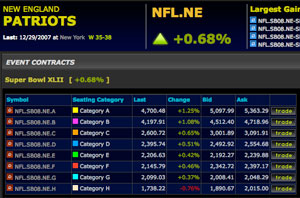 The world of secondary tickets for sporting events, shows and concerts is murky at its best, and downright fraudulent at its worst. I have first hand knowledge of this industry and wrote about it a year ago.
The world of secondary tickets for sporting events, shows and concerts is murky at its best, and downright fraudulent at its worst. I have first hand knowledge of this industry and wrote about it a year ago.
A lot of cash changes hands, making accounting difficult and tax evasion a competitive necessity for ticket brokers that want to stay ahead. A common practice among brokers is to sell a ticket to a consumer first and then go and find the ticket afterwards. If the broker misjudged the pricing – which is common – they often back out of the transaction. And since many states regulate or outright prohibit the secondary sale of tickets, the whole market tends to be a grey area, leading to further erosion of consumer confidence and even higher prices. Adding to the confusion – counterfeit tickets are still very common.
That never stopped eBay from diving into the business head first (while avoiding relatively tame markets like virtual goods). And they doubled-down last January with their $310 million acquisition of secondary ticket marketplace Stubhub.
But a new class of startups is emerging that is starting to securitize the ticket industry in ways that work very similar to the stock market. One startup, Yoonew, is pushing the envelope more than most.
For now Yoonew is focusing on football tickets, and the Super Bowl is their big event. People pay $2,000 or more (lots more) for Super Bowl tickets. If you want a good seat, and buy from a reputable broker (this is a relative term), you are quite simply going to be paying a staggering amount of money. If you wait to the last minute you might get a deal, particularly if the teams aren’t a draw. But you also run the risk of paying a lot more, or not getting in at all.
Behind the scenes are the market makers – the very select few individuals who actually have their hands on the tickets. These include players and NFL officials, official partners to the NFL, and the people who purchase tickets from them. How much they pay for those tickets is based on their analysis of the game economics, and they are putting serious capital at risk every year. They then turn around and sell those tickets to the public. If they’re good they make a lot of money. If not, they can lose their business over a single game.
 Yoonew is productizing that risk and bringing it down to the level of the individual ticket buyer – people who actually want to attend the game. Instead of buying a ticket early and not knowing if your team will even make it, people can simply buy a contract that delivers a ticket at no additional charge if their team makes it. If the team doesn’t make it, they’re out whatever they paid for the contract.
Yoonew is productizing that risk and bringing it down to the level of the individual ticket buyer – people who actually want to attend the game. Instead of buying a ticket early and not knowing if your team will even make it, people can simply buy a contract that delivers a ticket at no additional charge if their team makes it. If the team doesn’t make it, they’re out whatever they paid for the contract.
Prices are market based – and contracts can be purchased for as little as a few hundred dollars (prices are rising steadily now as the chances of any particular remaining team making it go up dramatically). That’s a big lure for rabid fans who can’t otherwise afford to attend the game. They pay now, and hope for the best.
Yoonew says they guarantee their contracts, and have never had an incident of fraud or non delivery. But I can’t find a link anywhere on the site to exactly what that guarantee is. An article in Forbes suggest it’s three times the price paid, but I don’t see evidence for that on the site. Even 3x your money won’t make up for the losses if your team makes it and you don’t get a ticket. So, as they say, Caveat Emptor.
There’s a good overall history of the company and founders here. The company was actually founded in 2004 but seems to have gone through some contractions and near bankruptcies as they perfected their model.